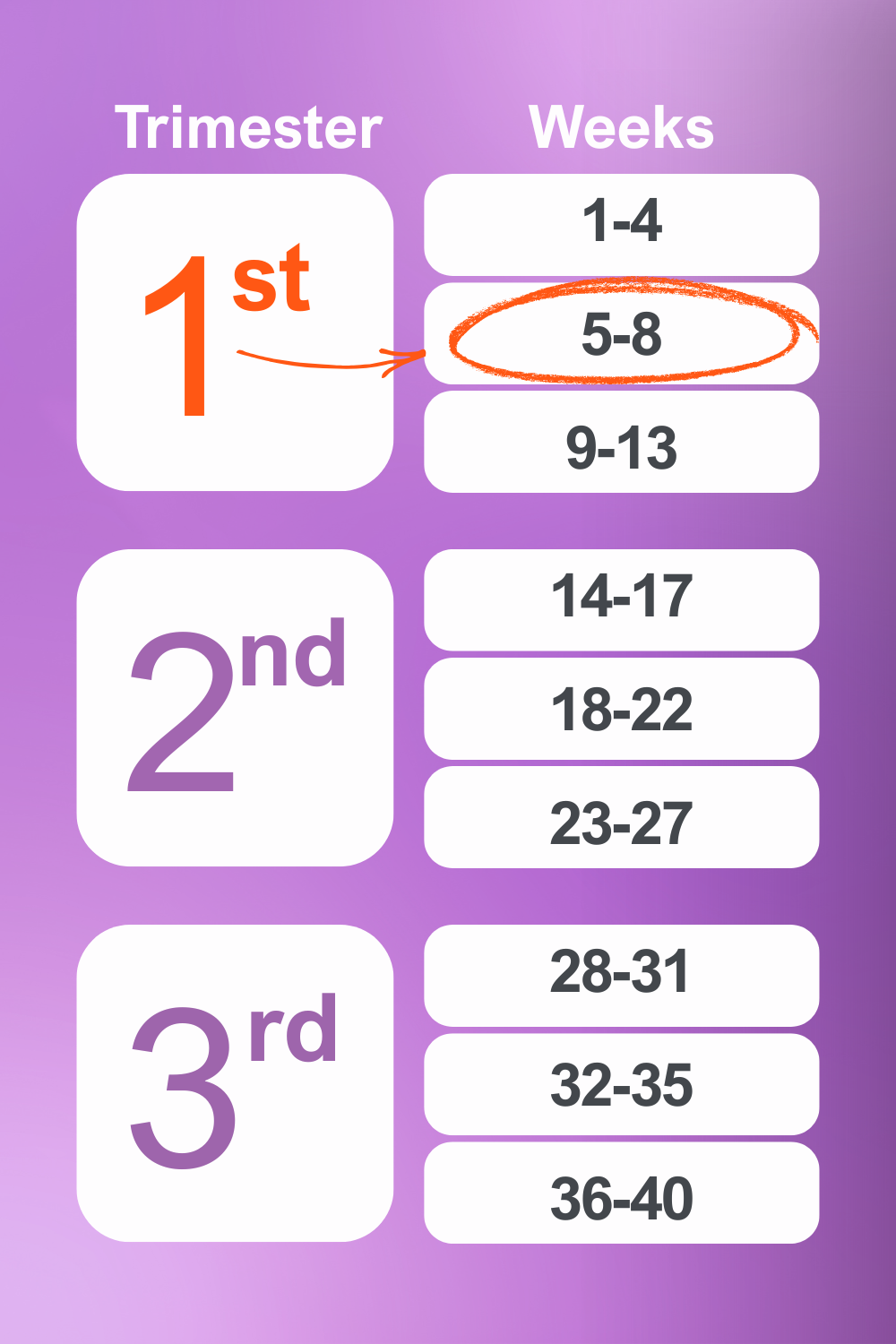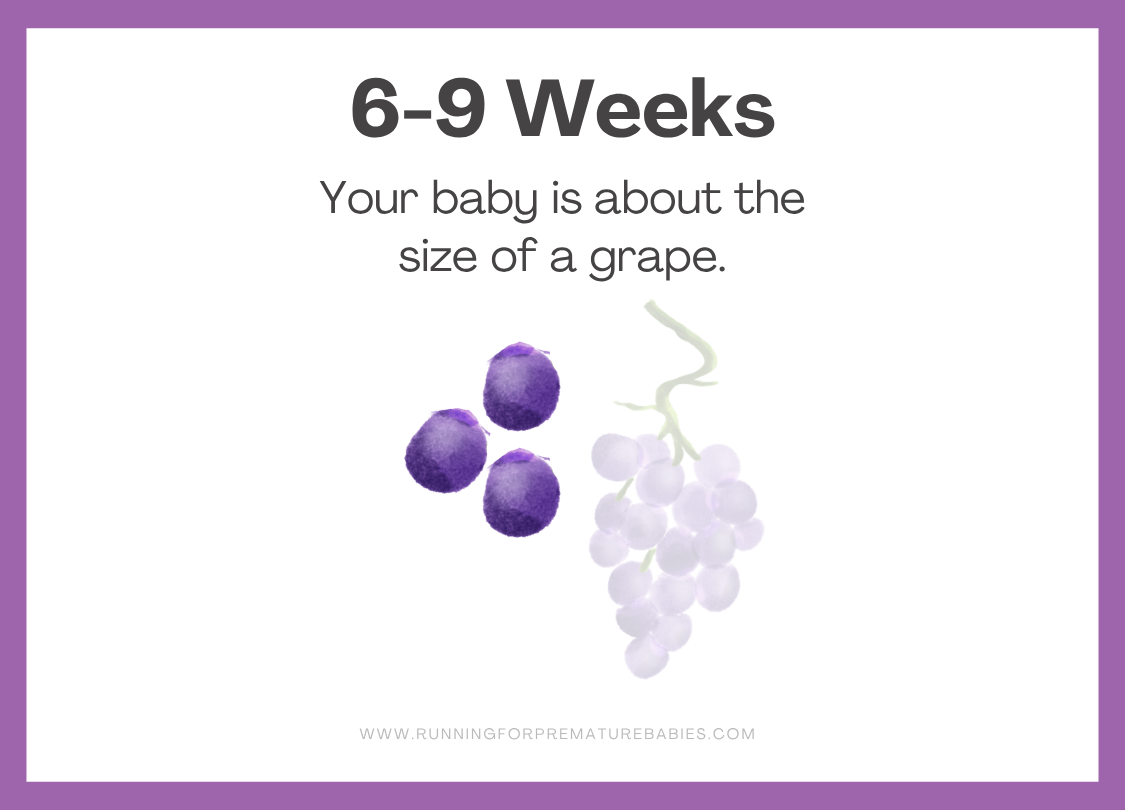Key Milestone Weeks in Pregnancy
First Trimester

6-9 Weeks: Facial features, eyes, ears, and toes begin to form.
Summary:
Between 6-9 weeks of pregnancy, your baby develops rapidly. From tiny limb buds and early facial features to a functioning heart and the formation of major organs. By week 9, your baby is about the size of a grape. Meanwhile, surging hormones like hCG, progesterone, and estrogen cause symptoms such as nausea, extreme fatigue, sore breasts, and mood swings. This is also the ideal time to begin antenatal care, get essential screenings, and ensure you’re taking folic acid. Most pregnancies at this stage are low-risk, and it’s generally safe to travel, have sex, and maintain light activity, unless advised otherwise by a doctor.
At 6-9 weeks pregnant what is happening inside my body?
From weeks 6-9 of pregnancy, your body continues to undergo major hormonal and physical changes to support your developing baby. Rising levels of hCG (human chorionic gonadotropin), progesterone, and estrogen can cause symptoms like nausea, fatigue, sore breasts, and mood swings. You may also experience frequent urination, bloating, constipation, dizziness, and heightened emotions. These shifts are normal, as your body works hard to form the placenta, increase blood flow, and support your baby’s early development. As blood volume increases to support your baby and build the placenta, this can often lead to dizziness or lower blood pressure. Your body is also increasing production of cervical mucus and thickening the uterine lining to sustain the pregnancy. It is a good time to begin antenatal care and check in on your emotional wellbeing, as around 1 in 5 people experience anxiety or depression during pregnancy.

At 6-9 weeks pregnant what is happening with my baby?
Between 6 - 9 weeks of pregnancy, your baby is growing at an incredible pace and by week 9 is around the size of a grape with the foundations of all major body systems.1
- Week 6: Tiny limb buds begin to form. These will become arms, legs, fingers, and toes. Structures for the eyes, ears, and mouth are also starting to take shape.
- Week 7: Your baby is about 1cm long and developing rapidly. The brain and spinal cord are forming, and the heart is beating strongly.
- Week 8: Major organs like the brain, stomach, and intestines are developing. The umbilical cord is fully formed and delivering nutrients and oxygen.
- Week 9: Your baby is now called a foetus. Facial features are becoming more defined like eyes and earsear. Tiny muscles are forming, allowing for small movements. Cartilage is also beginning to form, and bones are not far behind. The beginnings of genitals are forming, though it's too early to determine sex. The brain is growing rapidly, and brain waves can be detected.
See FAQs Below
Get Involved
Run with us
Donate
Join the Premmie Marathon Challenge
FAQs
When should I book my first antenatal appointment?
It is best to book your first antenatal appointment between 6-8 weeks of pregnancy, and ideally before 10 weeks. This early visit helps confirm your pregnancy, estimate your due date, and begin important health checks for both you and your baby. At this appointment, your GP or midwife will probably:
- Review your medical and family history
- Organise blood and urine tests
- Discuss lifestyle, nutrition, and supplements (like folic acid)
- Talk through your care options and where you’d like to give birth
To get started, you can book with your GP, who can refer you to a maternity service or midwife.
Can I have a scan between 6–9 weeks?
Yes, early ultrasounds between 6–9 weeks can confirm pregnancy location, assess heartbeat, and rule out complications. However, detailed anatomy scans are usually scheduled around 12 weeks.
Is it safe to have sex between 6-9 weeks pregnant?
For most people with a healthy pregnancy, sex between 6-9 weeks is completely safe. Unless your doctor or midwife has advised otherwise, having sex during early pregnancy will not harm your baby. Your baby is well protected by the amniotic sac, the uterus, and a thick mucus plug that seals the cervix. It is worth remembering your body is going through big changes, and it is normal for your desire, comfort, or preferences to shift. Some people feel more sensitive or tired, while others experience an increase in libido thanks to hormonal changes and increased blood flow.
Why am I so tired?
Feeling utterly wiped out between 6-9 weeks pregnant is one of the most common early pregnancy symptoms. This is because your body is undergoing major changes that demand a lot of energy. Things like hormonal surges can make you feel drowsy and emotionally drained.
Your body is building the placenta and with increased blood volume and a faster heart rate you are working hard to support your growing baby. You might also be dealing with nausea, disrupted sleep, frequent urination, or emotional ups and downs, all of which can leave you feeling exhausted. The good news is many people notice a boost in energy around the start of the second trimester. In the meantime, try to rest when you can, eat nourishing foods, stay hydrated, and be gentle with yourself.Tips for managing early pregnancy fatigue
- Nap when possible
- Eat iron-rich and protein-rich foods
- Stay hydrated
- Light movement like walking can increase energy levels
Why do I feel so emotional?
Hormonal fluctuations, especially rising estrogen and progesterone, affect brain chemistry and emotions. Feeling teary, anxious, or overwhelmed is normal, but reach out for support if symptoms persist or worsen.
Can I travel or fly at 6-9 weeks pregnant?
You can generally travel or fly safely between 6-9 weeks pregnant, as long as your pregnancy is uncomplicated and your healthcare provider gives the green light. Early pregnancy is usually a safe time to travel, but symptoms like nausea, fatigue, or frequent urination may make it less comfortable. Flying is not harmful to your baby, and most airlines allow travel without restrictions up to 28 weeks for a single pregnancy. Short domestic flights (under 4 hours) are typically fine. For longer flights, reduce the risk of blood clots (DVT) by:
- Wearing compression stockings
- Staying hydrated
- Walking or stretching regularly during the flight
You should consult your doctor before flying if you:
- Have a history of miscarriage or preterm labour
- Are experiencing bleeding or cramping
- Have a high-risk pregnancy or medical conditions like high blood pressure or diabetes
Consider your destination’s healthcare access and travel insurance cover, especially if you're travelling to remote areas or overseas.
Early Pregnancy Care Principles
The latest guidelines and care principles for early pregnancy include:
- Early antenatal visits: These are encouraged to confirm the pregnancy, estimate gestational age, and begin discussions about lifestyle, nutrition, and mental health.
- Folic acid supplementation: Strongly recommended to reduce the risk of neural tube defects, which are forming around week 5 of pregnancy.
- Screening for risk factors: This includes assessing for miscarriage risk, preeclampsia, and mental health concerns like anxiety or depression.
- Lifestyle guidance: Advice on avoiding alcohol, tobacco, and certain medications is emphasised early on, along with support for healthy eating and physical activity.
- Cultural and individualised care: The guidelines stress the importance of woman-centred care, especially for Aboriginal and Torres Strait Islander women, migrants, and those with complex needs.
Related reading:
First Trimester
What to expect when you're 3-4 weeks pregnant
What to expect when you're 5 weeks pregnant
What to expect when you're 6-9 weeks pregnant
What to expect when you're 10 weeks pregnant
What to expect when you're 12 weeks pregnant
What to exprect when you're 14 weeks pregnant
Second Trimester
What to expect when you're 18 weeks pregnant
What to expect when you're 20 weeks pregnant
What to expect when you're 22-23 weeks pregnant
What to expect when you're 24 weeks pregnant
What to expect when you're 26-27 weeks pregnant
Third Trimester
What to expect when you're 28 weeks pregnant
What to expect when you're 29 weeks pregnant
What to expect when you're 30 weeks pregnant
What to expect when you're 32-33 weeks pregnant
What to expect when you're 34 weeks pregnant
What to expect when you're 36 weeks pregnant
What to expect when you're 37 weeks pregnant
What to expect when you're 38-40 weeks pregnant
If you would like to run with us, either in memory of a precious baby, to celebrate new life, or simply to add purpose to your fitness journey, click here to find out how you can help give babies a better chance of survival.
Pregnancy, Birth and Baby. (n.d.). Pregnancy, birth, and baby. Australian Government. Retrieved 20th June 2025 https://www.pregnancybirthbaby.org.au/
South Eastern Sydney Local Health District. (2023, February). Travel in pregnancy (Factsheet). Royal Hospital for Women, N
SW Health. Retrieved 20th June 2025 https://www.seslhd.health.nsw.gov.au/sites/default/files/groups/Royal_Hospital_for_Women/Mothersafe/documents/Factsheets/TravelInPregFeb23.pdf
Australian Living Evidence Collaboration. (n.d.). LEAPP – Living Evidence for Australian Pregnancy and Postnatal Care. Living Evidence. Retrieved 20th June 2025 https://livingevidence.org.au/living-guidelines/leapp/


